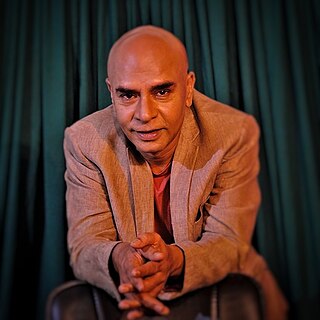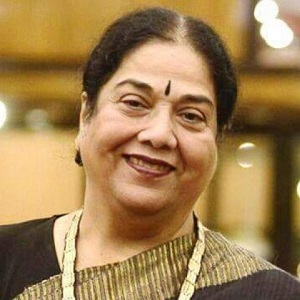
SoumitraChatterjee was an Indian film actor, play-director, playwright, writer, thespian and poet. He is regarded as one of the greatest and most influential actors in the history of Indian cinema. He is best known for his collaborations with director Satyajit Ray, with whom he worked in fourteen films.

Utpal Dutt was an Indian actor, director, and writer-playwright. He was primarily an actor in Bengali theatre, where he became a pioneering figure in Modern Indian theatre, when he founded the "Little Theatre Group" in 1949. This group enacted many English, Shakespearean and Brecht plays, in a period now known as the "Epic theatre" period, before it immersed itself completely in highly political and radical theatre. His plays became an apt vehicle for the expression of his Marxist ideologies, visible in socio-political plays such as Kallol (1965), Manusher Adhikar, Louha Manob (1964), Tiner Toloar and Maha-Bidroha. He also acted in over 100 Bengali and Hindi films in a career spanning 40 years, and remains most known for his roles in films such as Mrinal Sen’s Bhuvan Shome (1969), Satyajit Ray’s Agantuk (1991), Gautam Ghose’s Padma Nadir Majhi (1992) and Hrishikesh Mukherjee's breezy Hindi comedies such as Gol Maal (1979) and Rang Birangi (1983). He also did the role of a sculptor, Sir Digindra Narayan, in the episode Seemant Heera of Byomkesh Bakshi on Doordarshan in 1993, shortly before his death.

Nandikar is a theatre group in India. The group has its headquarters in Kolkata in the state of West Bengal, but works around the world.
Sombhu Mitra was an Indian film and stage actor, director, playwright, reciter and an Indian theatre personality, known especially for his involvement in Bengali theatre, where he is considered a pioneer. He remained associated with the Indian People's Theatre Association (IPTA) for a few years before founding the Bohurupee theatre group in Kolkata in 1948. He is most noted for films like Dharti Ke Lal (1946), Jagte Raho (1956), and his production of Rakta Karabi based on Rabindranath Tagore's play in 1954 and Chand Baniker Pala, his most noted play as a playwright.

Sudhindra Sircar, also known as Badal Sarkar, was an influential Indian dramatist and theatre director, most known for his anti-establishment plays during the Naxalite movement in the 1970s and taking theatre out of the proscenium and into public arena, when he transformed his own theatre company, Shatabdi as a third theatre group. He wrote more than fifty plays of which Ebong Indrajit, Basi Khabar, and Saari Raat are well known literary pieces. A pioneering figure in street theatre as well as in experimental and contemporary Bengali theatre with his egalitarian "Third Theatre", he prolifically wrote scripts for his Aanganmanch performances, and remains one of the most translated Indian playwrights. Though his early comedies were popular, it was his angst-ridden Evam Indrajit that became a landmark play in Indian theatre. Today, his rise as a prominent playwright in 1960s is seen as the coming of age of Modern Indian playwriting in Bengali, just as Vijay Tendulkar did it in Marathi, Mohan Rakesh in Hindi, and Girish Karnad in Kannada.
Pandit Jnan Prakash Ghosh was an Indian harmonium and tabla player from Farukhabad gharana of Hindustani classical music and musicologist.

Shyamanand Jalan was a Kolkata-based Indian theatre director, and actor. He is credited for the renaissance period of modern Indian theatre and especially the Hindi theatre in Kolkata from the 1960s to 1980s. He was the first to perform modernist Mohan Rakesh, starting with Ashadh Ka Ek Din in 1960 and in the coming years bridged the gap between Hindi theatre and Bengali theatre, by mounting Hindi productions of works by Bengali playwrights, like Badal Sircar's Evam Indrajit (1968) and Pagla Ghora (1971), which in turn introduced Sircar to rest of the country. In 2005, he directed his first and only film Eashwar Mime Co., which was an adaptation of Dibyendu Palit's story, Mukhabhinoy, by Vijay Tendulkar.

Goutam Halder is an Indian theatre and film actor from Kolkata. He has appeared in more than 50 theatrical productions since 1981 across various troupes, and is the recipient of several accolades including a State Award of Best Production for Meghnad Badh Kabya in 1995, State Award as Best Director for Chile Kothar Sepai in 1997, Aditya Vikram Birla Kala Kiran Award by Government of Maharasthra in 2001 and Shyamal Sen Smriti Samman in 2013.

Manoj Mitra was an Indian theatre, film and television actor, director and playwright.

Usha Ganguli was an Indian theatre director-actor and activist, most known for her work in Hindi theatre in Kolkata in the 1970s and 1980s. She founded Rangakarmee theatre group in 1976, known for its productions like Mahabhoj, Rudali, Court Martial, and Antaryatra. Apart from thespian Shyamanand Jalan of Padatik, she was the only other theatre director to practise Hindi theatre in Kolkata, which is largely Bengali speaking.
Khaled Choudhury was a theatre personality and artist of Bengal. He worked for various directors of both Bengali and Hindi plays, including Sombhu Mitra, Tripti Mitra, and Shyamanand Jalan in various capacities — creating the Stage, sets and costumes and later as music director. He was a bachelor. He has been awarded the Padma Bhushan for his contribution to theatre in India's Republic Day Honours List on 26 January 2012. He died on 30 April 2014 in Kolkata.
Tripti Mitra was a popular Indian actress of Bengali theatre and films, and wife of Sombhu Mitra, noted theatre director, with whom she co-founded pioneering theatre group Bohurupee in 1948. She has acted in films like Jukti Takko Aar Gappo and Dharti Ke Lal.

The group theatre of Kolkata refers to a tradition in theatres in the Indian city Kolkata, which developed in the 1940s as an alternative to entertainment-oriented theatres. As opposed to commercial theatres, group theatre is "a theatre that is not professional or commercial", characterized by its tendency for experimentation in theme, content and production, and its aim of using the proscenium stage to highlight social messages, rather than having primarily making-money objectives.

Swatilekha Sengupta was a Bengali actress. She had received the Sangeet Natak Akademi Award for her contribution to Indian theatre as an actor.
Debshankar Haldar is a Bengali theatre actor with a long career in Bengali theatre groups such as Nandikar, Rangapat, Natyaranga, Sudrak, Gandhar, Bratyajon, Sansriti and Blank Verse. Known for his versatility, he played the role of Debabrata Biswas in ‘Bratyajon’'s production ‘Ruddha Sangeet’, Swami Vivekananda in Lokkrishti's Biley and the historical theatrical figure Sisir Kumar Bhaduri in Indraranga's Nisshanga Samrat. Debshankar has also worked in films.
Sohini Sengupta is an Indian film and theatre actress. Daughter of actor Rudraprasad Sengupta and Swatilekha Sengupta, who are also active in theatre, Sohini is one of the leading actors of the Bengali theatre group Nandikar. As a member of the group, she has worked with prominent theatre personalities such as Debshankar Halder, Sumanto Gangopadhyay and Parthapratim Deb, and was awarded Sangeet Natak Akademi's 2007 Ustad Bismillah Khan Yuva Puraskar for contributions to theatre. She also played a supporting role in Aparna Sen’s film Paromitar Ek Din (2000) for which she won the Best Supporting Actress award at the 2000 National Film Awards.
Tapas Sen was a noted Indian stage lighting designer, who was an important figure in 20th-century Indian theatre. He started working with Bengali theatre movement in Kolkata in the late 1940s, along with noted directors, Utpal Dutt and Shambhu Mitra. Later he became a founding member of the Indian People's Theatre Association's (IPTA), Delhi chapter, and worked closely with Hindi theatre. Through his career stretching five decades he worked theatre directors, Ebrahim Alkazi, Vijay Tendulkar, and also dancers Sadhana Bose, Chandralekha, Birju Maharaj and Kelucharan Mahapatra. He was known not only for his creative stage lighting, but also had a significant impact on the work of leading theatre director of the time.
Ajitesh Bandopadhyay was an Indian actor, playwright, activist and director. He along with Shambhu Mitra and Utpal Dutt are considered to be the doyens of Bengali theatre of the post - Independence era.
Asit Bandopadhyay was a Bengali playwright, screenwriter, actor and director. He was associated with the Nandikar theater group. He lived and worked in Kolkata, India.

Parthapratim Deb is an Indian actor, director, playwright, singer and music composer in Bengali theater. He is a member of Nandikar since 1986 and also runs his own theatre organization, Baghajatin Alaap in 2005.











